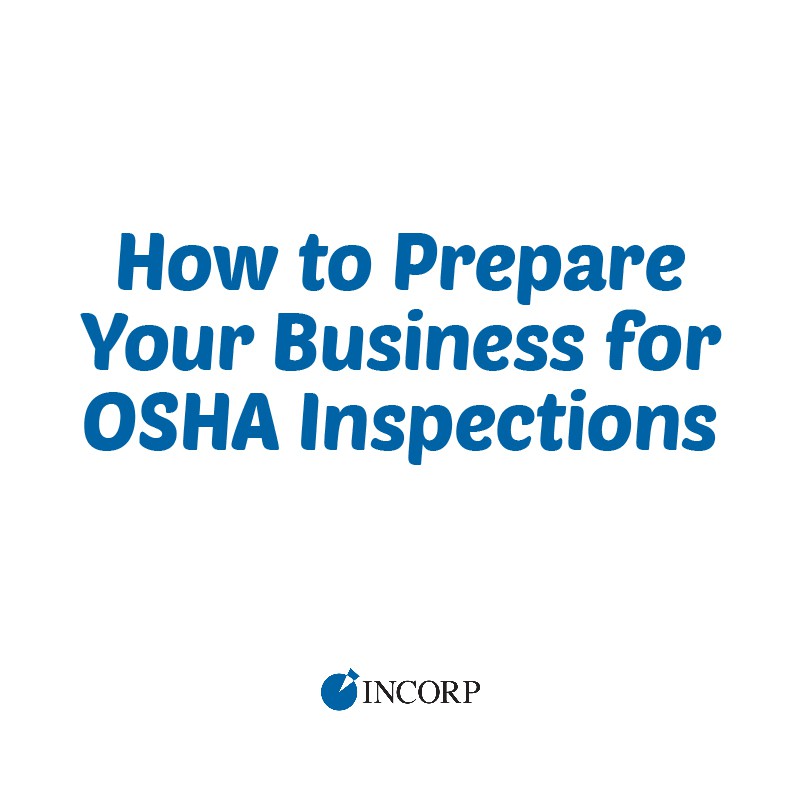Stay in the know!
Join our newsletter for special offers.
For many business owners, OSHA inspections are tied with IRS audits for the No. 1 spot on their fear-o-meter. However, OSHA (United States Occupational Safety and Health Administration) provides a variety of free resources to help companies operate safe workplaces, so if a routine inspection does occur, they can pass with flying colors (and no fear).
Congress established OSHA as an agency of the United States Department of Labor in 1970. Its mission is to "assure safe and healthful working conditions for working men and women by setting and enforcing standards and by providing training, outreach, education and assistance.1 Since its founding, workplace fatalities have been reduced from about 38 worker deaths a day in 1970 to 12 a day in 2012. Worker injuries and illnesses are also down - from 10.9 incidents per 100 workers in 1972 to 3.5 per 100 in 2011.2
Whether you operate a business with high safety risks (a construction job site or chemical factory) or low risks (a small office or retail shop), programs designed to prevent workplace injury and illness can provide many benefits, including lowering workers' compensation costs, reducing lost workdays, limiting equipment damage, and improving worker morale.
OSHA provided free assistance in fiscal year 2012 to over 30,000 small businesses covering 1.5 million workers. Here are some of the many programs it offers:
OSHA's On-site Consultation Program provides free advice for small and medium-sized businesses. A consultant from a state partner agency will study your workplace, discuss applicable OSHA standards, and point out conditions that may pose safety or health risks to your employees. He may recommend measures such as safety training and self-inspections to prevent future hazardous situations.
After the visit, the consultant will sit down with you and discuss his findings, including any safety or health issues that need to be addressed. Later, he will send you a detailed written report, including the actions you have mutually agreed on to correct any deficiencies. Obviously, you will be required to take care of any serious job safety and health hazards in a timely manner. However, the On-site Consultation program is completely separate from OSHA's inspection unit. If the consultant identifies workplace hazards during the visit, that information will not be passed on to inspection staff, and no citations are issued or penalties assessed.
Participating in this program could even qualify you for an exemption from routine OSHA inspections. The On-site Consultation Program's Safety and Health Achievement Recognition Program (SHARP) “recognizes small business employers who operate an exemplary injury and illness prevention program”.3 If you qualify for this recognition, OSHA exempts your worksite from OSHA programmed inspections for up to 2 years, with renewal for up to 3 years if you remain in compliance.
Want to get started? To request a free on-site visit, contact the partner agency in your state. Priority will be given to high-risk workplaces, but any small or medium-sized business can participate.
Businesses, labor groups, and other organizations can work cooperatively with OSHA to help prevent fatalities, injuries, and illnesses in the workplace. OSHA Strategic Partnerships focus on improving safety and health in major corporations, government agencies, and large construction projects. If your company or agency is interested in working cooperatively with OSHA, contact your state agency for information.
OSHA's Training Institute, located near Chicago, and OSHA's Training Education Centers across the country provide courses in safety and health, including one-day or half-day seminars on safety and health for small business employers. In addition, OSHA's area offices offer audiovisual aids and other resources, technical advice, and speakers for special events.
OSHA's Diverse Workforce/Limited English Proficiency (LEP) Coordinators can provide training materials and other OSHA resources in languages other than English. They assist small businesses, trade associations, unions, and community groups with outreach, education, and training and are available for seminars, workshops, and speaking events for diverse workers.
OSHA eTools are interactive, Web-based training tools on a wide variety of occupational safety and health topics -- everything from baggage handling to poultry processing, and computer workstations to scaffolding. Some use interactive modules that enable the user to answer questions and receive advice on how OSHA regulations apply to their particular work site.
OSHA publications include brochures, fact sheets, posters, and a variety of other printed materials that can be downloaded or ordered online from the OSHA website. You can also sign up for a newsletter with articles and helpful tips.
Take advantage of OSHA's resources to help keep your workers safe and healthy, and improve the health of your bottom line at the same time.
Join our newsletter for special offers.
